Key drivers of consumer loyalty in travel
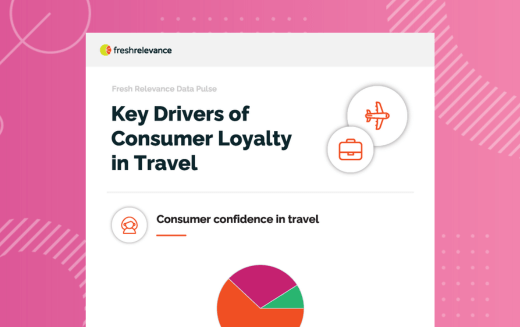
With Covid-19 travel restrictions subsiding across the world, consumers are ready to start traveling again and many businesses have seen a surge in bookings as a result of pent-up demand. Now is the time to capitalize on this increase in bookings by converting those travelers into loyal customers who return to book trips and accommodation year after year.
Together with Censuswide, we polled 2000 consumers across the UK to gauge the level of confidence in traveling again, find out how the Covid-19 pandemic has changed attitudes and behavior towards booking travel, and discover what drives consumer loyalty in travel.
Key takeaways:
- After what has been perhaps the toughest period for the travel industry, opportunities for growth are returning, with more than half of consumers feeling confident to travel again (62%) and 1 in 4 consumers (25%) saying they are willing to spend more money on a vacation now compared to pre-Covid-19 pandemic. This is especially the case for Gen Z consumers, with 49% saying they are willing to spend more money.
- Travel companies need to assess and optimize their customer booking journeys, since almost half of consumers (41%) say they consider the booking experience to be more important now compared to pre-Covid-19 pandemic and 1 in 3 consumers (34%) are spending more time on the booking process now compared to pre-pandemic. This is especially the case for younger consumers aged 18-34, with almost half of this group (45%) spending more time on the booking process now.
- There are a number of ways travel companies can keep customers loyal, such as displaying ratings and reviews to demonstrate trustworthiness, implementing personalized product recommendations to make it easy for customers to find the vacation they’re looking for, and segmenting returning customers to target them with loyalty perks.
Consumer confidence in travel
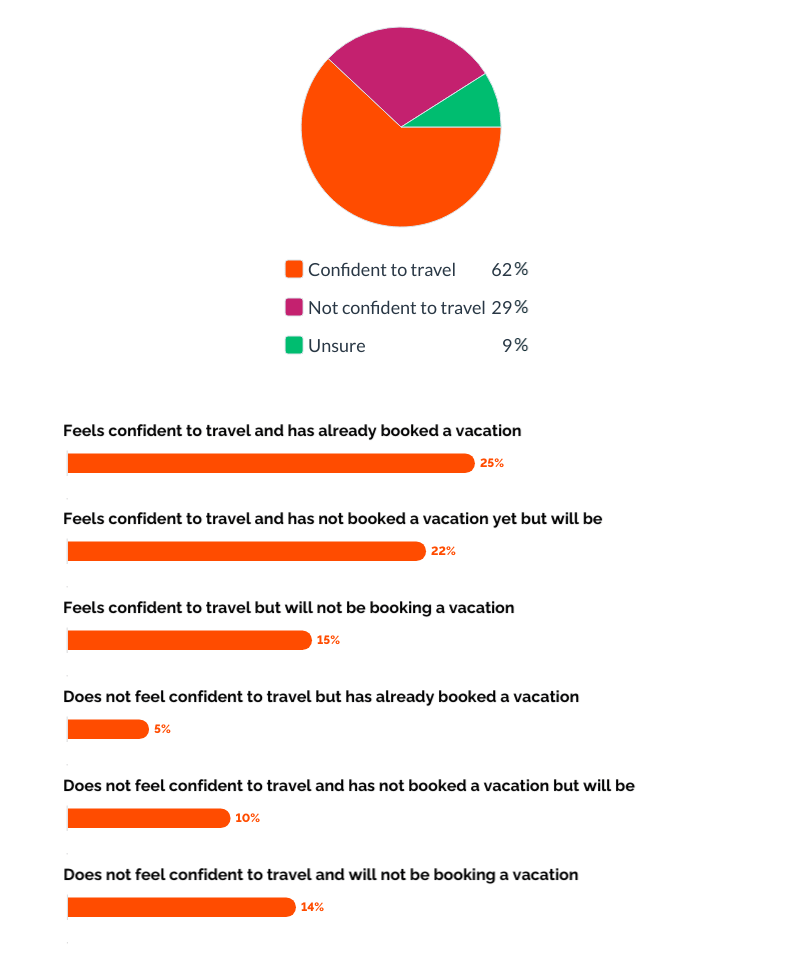
The data shows that the majority of consumers (62%) feel confident to travel again. What’s more, 30% of consumers have already booked a vacation this year and another 32% of consumers plan to, so there are plenty of opportunities for travel companies to convert lookers into bookers. The key is to optimize the booking journey to keep customers loyal and avoid frustrating them, which we will discuss in more detail in the next sections.
How Covid-19 has changed travel booking behavior
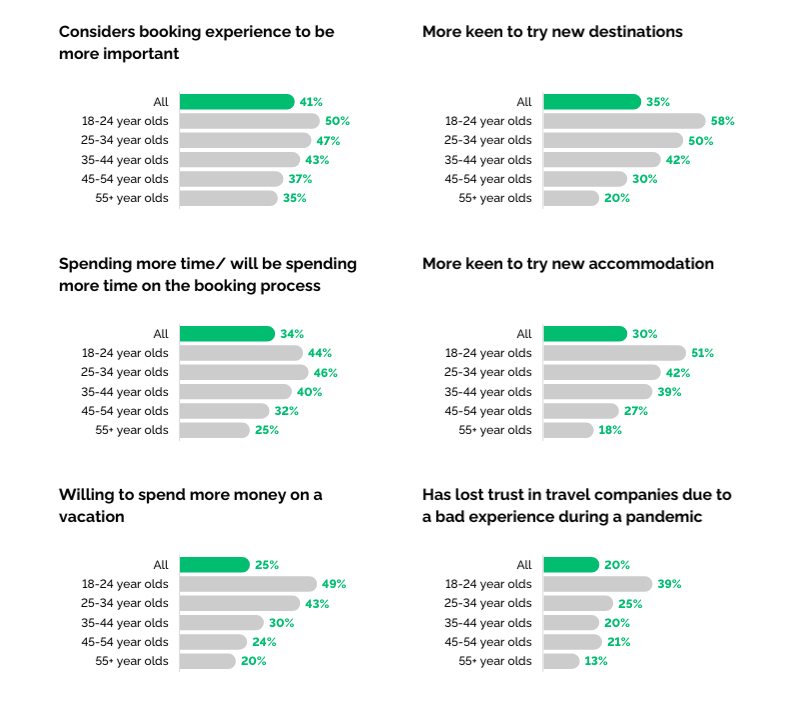
The booking experience has become more important post-pandemic for 41% of consumers. This is especially true for younger consumers, with 1 in 2 Gen Z travelers selecting this option. Similarly, more than 1 in 3 consumers (34%) are spending more time on the booking process now compared to pre-Covid-19 pandemic, and again, this is a bigger trend for younger consumers, with almost half of 18-34 year olds (45%) selecting this option. This means travel companies need to review and optimize their customer booking experience to match these higher expectations.
With 30% of consumers willing to spend more money on a vacation now compared to pre-Covid-19 pandemic (for example on upgraded accommodation or staying for a longer period), travel companies have the opportunity to upsell and increase their average order value (AOV). Product recommendations could be useful here, for example showing add-on items at the checkout (such as the option to hire a rental car or tag an extra night on to their stay). For returning customers, travel companies could display recommendations that are slightly more expensive than the vacations they have booked in the past. This could entail recommending 4 star hotels if the customer has previously booked 3 star hotels, or displaying options for bigger rooms than the customer has booked in the past.
The younger generations are particularly willing to spend more money on vacations, with almost half of Gen Z consumers (49%) selecting this option. This willingness decreases with age, so travel companies should consider their upsell approaches depending on the age of their target market.
Many consumers are more keen to try new destinations and accommodation now post-pandemic, especially the younger age groups, with more than 1 in 2 Gen Z consumers selecting these options. Travel companies should inspire consumers and introduce them to new destinations and accommodation, for example by recommending destinations that are trending with other travelers or displaying user-generated content, such as photos of other customers’ trips.
20% of consumers have lost trust in travel companies due to a bad experience during the pandemic. This number decreases through the age spectrum, with 39% of Gen Z selecting this option, compared to only 13% of Baby Boomers. This could be related to the higher expectations younger travelers have. The travel industry will need to rebuild this trust with a trustworthy booking experience and clear cancellation policies.
Why consumers stay loyal to travel companies
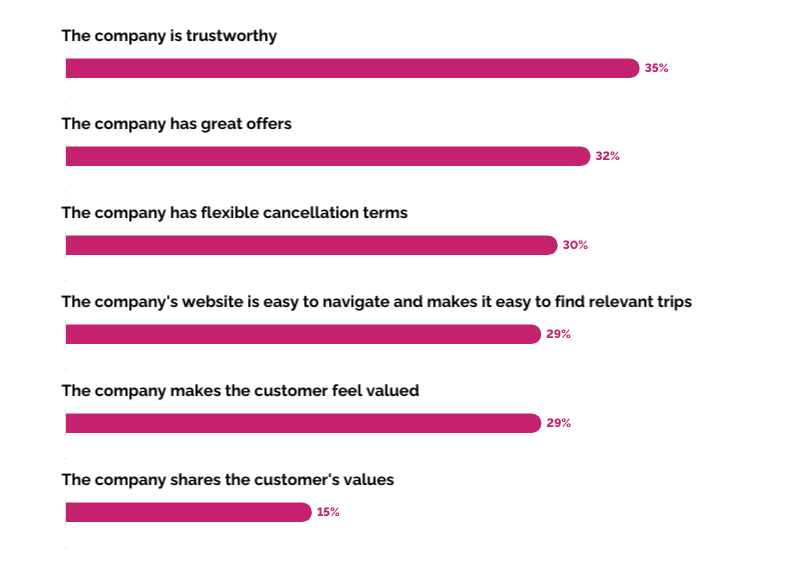
Trustworthiness is the most important trait to consumers when it comes to staying loyal to a travel company. Social proof tactics such as ratings and reviews and user-generated content are great ways to boost loyalty. For example, travel companies can display ratings and reviews on accommodation pages, as well as photos that other travelers have shared showing their experience staying there.
Receiving great offers is another important aspect of consumer loyalty. Travel companies can use browse behavior and past booking data to really target their offers and delight each customer with vacation content that resonates with them.
Unsurprisingly, flexible cancellation terms are another key driver of customer loyalty.
The data also shows that consumers are more loyal to travel companies whose websites are easy to navigate and make it easy for them to find the trips/accommodation they’re looking for. Product recommendations based on the individual’s past browse and purchase data are a great way to help customers head straight for the parts of the website that are relevant and interesting to them.
Making the customer feel valued is another key factor when it comes to driving loyalty. Travel companies should consider segmenting their repeat customers to target them with loyalty perks, such as special discounts or early access to sales.
Finally, a smaller proportion of consumers stay loyal to travel companies who share their values, such as sustainability. This is highest for Gen Z, with 20% of this age group selecting this option. Travel companies should consider putting a strategy in place for communicating their values, especially if they cater to this younger demographic.
Learn more about optimizing the travel booking experience and see real-life examples from travel brands in our Travel Lookbook.
What frustrates consumers when booking travel
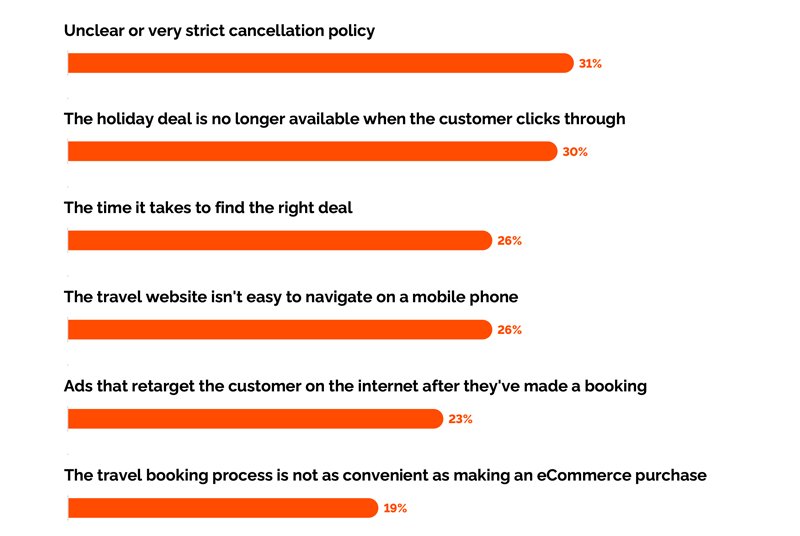
As we saw in the previous section, consumers pay attention to a travel company’s cancellation policy. As much as a flexible cancellation policy drives loyalty, unclear or very strict cancellation policies are a key source of frustration for consumers when booking travel.
Consumers also get frustrated when a holiday deal is no longer available when they click through to redeem the offer. Dynamic coupons that display ‘coupon expired’ text if a customer opens your email after a coupon has expired are a fantastic way to resolve this issue. Additionally, using dynamic email content in general will ensure emails are always up to date at the time of open (or between send time and open time within Apple Mail) and only display deals that are available at that point.
Some consumers get frustrated with the time it takes to find the right deal. Providing a personalized booking experience, such as through the use of personalized product recommendations, is an effective way to help connect customers with their perfect vacation quicker.
Consumers also get frustrated if a travel website isn’t easy to navigate on a mobile phone, especially younger consumers, so travel companies should make sure their websites are mobile friendly to avoid consumers bouncing to a competitor with a better mobile experience.
Ads that retarget consumers after they’ve made a booking are another source of frustration. Travel companies should consider using segmentation to exclude those customers from being targeted. Not only will this avoid frustrating existing customers, it will also help companies spend their ad budget on only targeting people who haven’t made a purchase yet. If you don’t have the right tools and data, however, it can be difficult to segment customers effectively. Often, behavioral and transactional customer data sit in inaccessible silos, in an unhelpful format. So creating marketing segments can mean manually moving around large quantities of personal data which poses challenges under GDPR. That’s why it’s really important to have the right technology in place to enable you to successfully implement segmentation and behavioral targeting. Learn more about choosing the right tool for segmentation and behavioral targeting.
Final thoughts
The survey found that consumers visit 7 websites on average before making a booking. This, in addition to more travelers being open to trying new accommodation and destinations this year, underlines the importance of getting the experience right from the moment a customer lands on your website to avoid losing them to a competitor.
Download the infographic to view and save all the data visualizations shown here in one place.
 04/26/2022
04/26/2022 